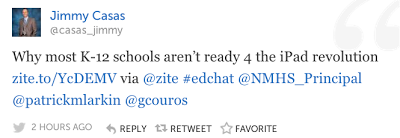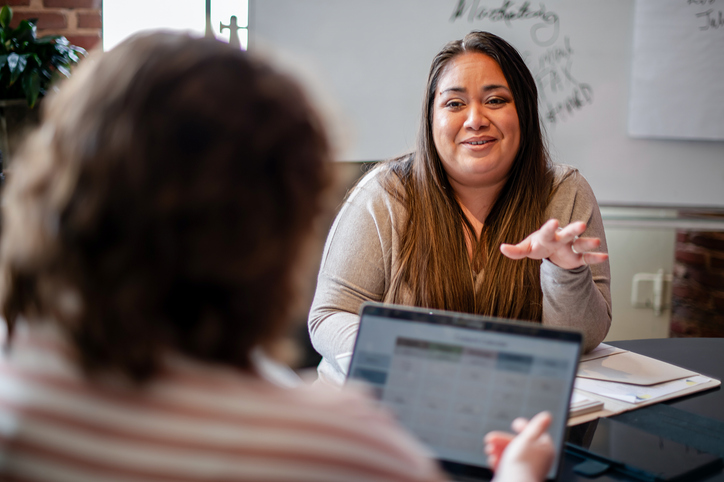Who Cares About Devices!?

So I received the tweet below from a friend in Iowa this morning:
Being one of the first schools in our region to go all in on iPads at the high school level, I am always interested in reading the perspectives of others on this topic. I think that there are a number of questions that need to be addressed for schools thinking about increasing the number of devices in their classrooms or moving towards a 1:1 program. The post referenced in the tweet by my friend Jimmy, a high school principal in Iowa, is worth a read for people looking at investing in iPads (or going 1:1 with any device).
The post, Why most K-12 schools aren't ready for the iPad Revolution, cites four reasons that most schools are not prepared to purchase iPads for all students. The four reasons cited by the author, Mike Reiners (CEO of Nomad), are as follows:
- Teaching requires planning.
- Consider where we’re spending our education dollars.
- The iPad is primarily a consumption device.
- Our students should be mobile multilingual.
Below are my thoughts on each of the points.
Teaching requires planning
Yes, I could not agree more. Our Superintendent is fond of saying, "Teaching is hard and Technology used to be hard. But even though the technology has gotten easier, the teaching is still hard and it will always be hard." Despite the fact that the technology is easier, the sheer number of resources available when you add web-enabled devices to the mix can be overwhelming. I agree with Reiners point that thought and consideration and support are needed so that teachers have opportunities to prepare for this shift. In Burlington, we spend a year and a half before we had iPads teaching staff members about a variety of digital tools that they would be able to access and integrate into their curricular areas with any mobile device. We also focused on resources that we thought would save teachers time and could potentially increase student engagement.
Consider where we’re spending our education dollars
This consideration is one that we actually utilized to help us purchase our devices in Burlington. I am pretty sure that many schools do not spend enough time looking at what they are spending their money on now. What are some of the annually purchases that we make that we just don't think about? (i.e. paper, printers, textbooks, computers, etc.) Our purchase of the iPads saved us in the vicinity of $100,000 due to the fact that we were looking at new options for a Foreign Language Lab and that does not take into consideration that most schools also add a para-professional to the mix to help maintain such a lab. We were also able to stop our annual expenditures on maintaining other labs in the building that were used primarily for word processing and research since the purchase of the devices allowed us to have this access in every classroom. Add in the fact, that we are no longer making large-scale textbook purchases for a course and we were well on our way to the amount needed to purchase our devices.
Tools and ideas to transform education. Sign up below.
The iPad is primarily a consumption device
I've heard this one over and over, but I agree with the words of Scott Meech who hit on this topic a while back during the 2011 K-12 Online Conference in his session on "Purposeful Play:"
"Many argue that the iPad is the premiere consumption device at this time but it isn’t very good at creating. Is that accurate? I tend to believe that the iPad is an amazingly creative device and the user is the only limit for the device."
Adam Webster also wrote a post on Edudemic a while back titled 5 Reasons The iPad Will Stay King Of The Classroomin which he stated:
"The iPad, its workflow and its apps, allow for real change and makes it easy. Your students will create work that not only wasn’t possible before their innovative use of the technology, but that you as their teacher had never even thought of."
Our students should be mobile multilingual
This definitely should be the goal for our students and I touched on this idea in a post back in January titled Is The iPad King? It Is For Us And That's All That Matters (For Now). My concluding statement in the post was - "While I believe that we have made the best decision for our school today, things change quickly and we need to create organizational and individual flexibility to adapt to these changes when they occur." Royan Lee wrote a wonderful post on this topic about a month ago on his blog titled "Why Mish-Mash Is Better Than 1:1." In the post he noted:
"I prefer teaching with the limitations of no class sets, because it means we’re constantly reflecting on the merits of each tool for the given purpose."
The bottom line is that we need to make sure that the adults in the schools are modeling the flexibility and adaptability in their practice that our students are going to need to have to be successful. All of us who work in schools know that this is can be difficult since change is not something common in our traditional educational system and we have grown comfortable with many tools, workflows, and practices that are long outdated. In fact, the most important statement made in the post by Reiners is the one at the end which notes:
"In summary, let’s think about what we’re doing. Blind, quick-trigger actions in education, especially expensive and invasive ones, have historically disastrous results."
I find this a bit ironic considering that some would say that we are exactly in this place with our mandated standardized testing and the development of the common core, two things that have certainly been expensive and invasive. While I could speculate on the results, that is probably best left for a future post.
The bottom line is that we don't need any new devices in our schools; what we really need is new thinking in regards to our purpose for having schools. Any implementation of new gadgets and gizmos which strives to simply integrate them into our "traditional system" with teacher-focused learning environments instead of learner-centered environments is destined to have "disastrous results."
cross-posted at www.patrickmlarkin.com
Patrick Larkin is the Assistant Superintendent for Learning of Burlington Public Schools in Burlington, MA and the former principal of Burlington High. He blogs about education at www.patrickmlarkin.com.
